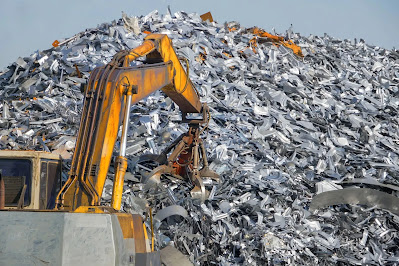How Recycling Metal Boosts Industry Sustainability?
In today's world, the concept of sustainability has become increasingly important. As industries strive to reduce their environmental impact and preserve natural resources, recycling scrap metal Melbourne has emerged as a crucial practice in achieving these sustainability goals.
Scrap metal, which includes discarded metal products and materials, holds immense potential for promoting industrial sustainability. This article explores the environmental, economic, technological, and community-oriented aspects of recycling metal, shedding light on its significance for sustainable industry practices.
The Environmental Impact of Scrap Metal
Scrap metal recycling plays a pivotal role in mitigating environmental degradation. The recycling process significantly reduces energy consumption and greenhouse gas emissions by diverting metal waste from landfills and incinerators. This reduction occurs because recycling metal requires less energy than extracting raw materials, such as iron ore and copper. As a result, the overall carbon footprint of industries involved in metal production and manufacturing is substantially reduced.
Furthermore, preserving natural resources and habitats is a crucial outcome of metal recycling. Instead of mining and extracting new metal ores, using recycled metal helps conserve valuable resources and minimises the disruption of ecosystems. The importance of this preservation cannot be overstated, as it contributes to the planet's overall health and ensures the availability of resources for future generations.
Economic Advantages of Recycling Scrap Metal
In addition to its environmental benefits, recycling scrap metal Melbourne offers significant economic advantages for businesses. The cost-effectiveness of utilising recycled metal, as opposed to raw materials, can lead to substantial savings in production costs. This cost reduction is especially beneficial in industries reliant on metal for manufacturing and construction purposes.
Moreover, the process of recycling scrap metal creates opportunities for job creation and economic growth within the recycling industry. From metal collection and sorting to processing and distribution, various stages of the recycling process require a skilled workforce, thus contributing to employment opportunities in local communities. This economic stimulation extends beyond the recycling sector, as businesses that engage in metal recycling can potentially witness increased revenue by selling recycled metal materials.
Technology and Innovation in Scrap Metal Recycling
Advancements in technology have revolutionised the scrap metal recycling industry, leading to improved efficiency and reduced environmental impact. Modern recycling facilities are equipped with state-of-the-art technologies that facilitate scrap metal sorting, processing, and purification. These innovations enhance the quality of recycled metal and ensure that the recycling process is carried out with minimal energy consumption and waste generation.
Furthermore, implementing advanced technologies in metal recycling techniques has resulted in a more streamlined and environmentally conscious approach. For instance, using automated sorting systems and advanced shredding equipment has increased metal recovery efficiency and reduced the need for manual labour. Such technological innovations align with the broader goal of sustainable industry practices, demonstrating the industry's commitment to minimising its environmental footprint.
The Role of Government Policies and Regulations
Government policies and regulations are pivotal in promoting and regulating scrap metal recycling as part of sustainable development goals. Many governments have recognised the significance of metal recycling in achieving environmental objectives and have thus introduced initiatives to support and incentivise recycling practices. These initiatives include financial incentives, tax credits, and grants for businesses that actively engage in metal recycling and demonstrate environmentally responsible practices.
Moreover, regulations governing the proper handling and disposal of metal waste have contributed to the responsible management of scrap metal. By imposing strict guidelines on waste management and promoting the safe handling of hazardous materials, governments have ensured that scrap metal recycling is conducted in a manner that prioritises environmental protection and public health. Case studies highlighting the positive impact of supportive policies on industry sustainability serve as compelling evidence of the effectiveness of government interventions in promoting responsible metal recycling practices.
Promoting Community Engagement in Scrap Metal Recycling
Raising public awareness about the benefits of scrap metal recycling is essential for fostering community engagement in recycling programs. Individuals and communities play a crucial role in collecting and segregating metal waste, thereby contributing to the overall success of recycling initiatives. Strategies for encouraging community participation include educational campaigns, outreach programs, and the establishment of convenient recycling centres.
Successful recycling programs often result from collaborative efforts between businesses, local communities, and environmental organisations. By partnering with local businesses and community groups, recycling initiatives can reach a wider audience and garner support for metal recycling. The involvement of ecological organisations further amplifies the impact of such programs, as they bring expertise and resources to promote sustainable waste management practices.
In conclusion, the significance of recycling metal for sustainable industry practices cannot be overstated. The environmental benefits, economic advantages, technological innovations, government interventions, and community engagement associated with scrap metal recycling collectively promote industrial sustainability.
In the quest for sustainable industry practices, scrap metal Melbourne recycling stands as a beacon of hope, offering tangible solutions to mitigate environmental challenges and foster a more resilient and responsible industrial landscape. Through collective action and unwavering commitment, we can pave the way for a future where sustainability is not just a goal but a way of life.



Comments
Post a Comment